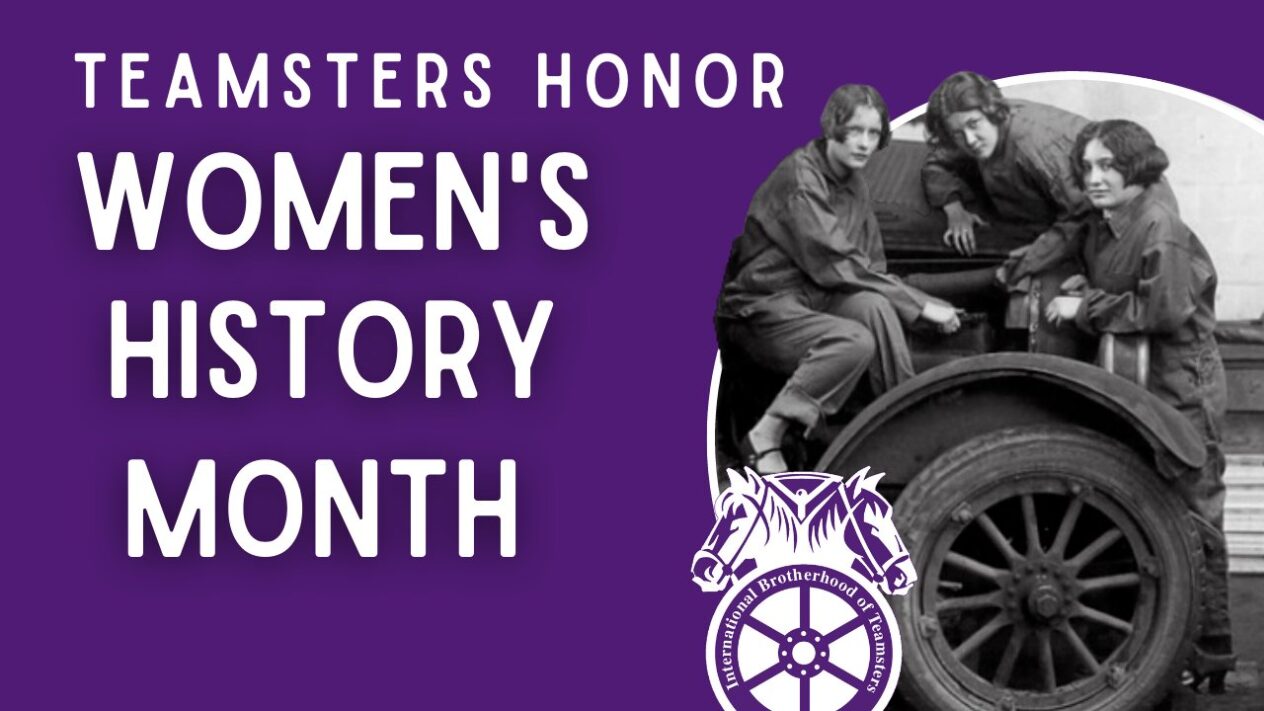Headline News
Teamsters Honor Women’s History Month

March is Women’s History Month and on March 8 annually we celebrate International Women’s Day.
The Teamsters Union is proud to honor and recognize the achievements of our sisters during this month and throughout the year.
As an organization that advocates and fights for the rights of working people, it is thanks to the tireless efforts of the trailblazing women throughout our history that our union is strong and a force for good for workers across this continent.
The women of our past—Mother Jones, Clara Day, Mazie Laham, Marie Kemple and many, many more—helped shape our labor movement and provide opportunities for millions of workers.
One hundred years ago, Teamsters had reins in their hands and delivered goods on horses. In 1918, during another pandemic, the Spanish Influenza, Teamster women truck drivers participated in a national program to bring doctors and medicine to rural areas and received commendations for their service.
In 1920, women won the right to vote, but it took decades longer for Black women to be able to vote due to state laws that kept Black Americans from the polls, and voter suppression is a battle we are fighting to this day.
Yet, we have come far. During this month’s State of the Union address, for the first time in American history, two powerful women sat behind the president—the vice president and the Speaker of the House.
Women are winning more seats in Congress, more seats in the board room, more positions as leaders of unions and are actively leading in their workplaces, be it a warehouse, hospital, or food processing plant.
Getting Organized
However, there is always more work to be done.
The COVID-19 pandemic shone a brighter light on the existing disparities for women in the workplace. Many women workers deemed essential to our economy needed to go to work every day but faced a lack of childcare and were forced to make tough decisions.
Nonunion workers too often faced a struggle to recover from COVID-19 due to a lack of contractually negotiated employer-provided time off, and paid the cost again when the hospital bill arrived in the mail.
Facing these conditions, more women have joined their colleagues to organize, and are not afraid to go on strike, if necessary, to win a strong contract. Case in point, last October was deemed “Striketober” for all of the strike activity taking place.
This year, from Starbucks workers to journalists to Amazon workers, workers in all types of industries have made it clear they’ve had enough. Fed up with poor working conditions, disrespect, and being called essential yet not treated as such, they’re speaking out and taking action.
According to Gallup data from last year, approval of labor unions is at its highest point since 1965. Approval of unions is particularly high among young adults, at 77 percent; and for those with annual household incomes under $40,000, at 72 percent.
Among the leaders of these efforts are women.
As one example among many, last month, NBC News reported on the brave women at Amy’s Kitchen, a vegan and vegetarian food company that sells products globally. This largely Latina, Spanish-speaking female workforce of about 500 workers in Santa Rosa, Calif., came forward, without fear, and shared the gruesome details of workplace injuries that they sustained on the food production and packaging line.
They garnered the support of the vegan, vegetarian, immigrant and worker rights communities, and their story was widely shared in the media. They’ve filed a Cal/OSHA complaint about their working conditions, and they are demanding a meeting with the company’s CEO, along with their Teamster advocates, to come to a permanent solution to better their working conditions. They are not afraid of the union busters the company hired; they’re speaking up for their right to form a union; they’re vocal and will not succumb to intimidation. They know their worth.
They know that generations of women before them fought for equality and justice, not just for women but for all genders, and they will not be deterred. They’re part of a movement that is growing, increasing in visibility, one that will shape the future of the work force and our labor movement for years to come.